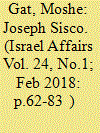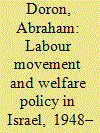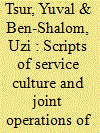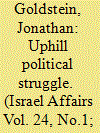|
|
|
Sort Order |
|
|
|
Items / Page
|
|
|
|
|
|
|
| Srl | Item |
| 1 |
ID:
158156


|
|
|
|
|
| Summary/Abstract |
Recently, scholars have identified the existence of a distinct Israeli diaspora, as a group separate from the wider Jewish diaspora. The article presents quantitative data collected in Australia that supports this perception. The distinctiveness of Ausraelis ‒ the Israeli diaspora in Australia ‒ is manifested in detachment from Australian Jewry; the preservation of Israeli national identity; and an affiliative model of ties with the ‘real’ homeland, Israel, as opposed to an affiliative interaction of the Jewish diaspora with Israel, the ‘virtual’ homeland.
|
|
|
|
|
|
|
|
|
|
|
|
|
|
|
|
| 2 |
ID:
158153


|
|
|
|
|
| Summary/Abstract |
This article compares the struggle of two groups in Israel for housing rights. Following Schneider and Ingram’s model, the article analyses the influence of the social construction of each group ‒ residents of the communal rural sector as an advantaged group, and public housing tenants as a dependent group ‒ on its housing rights. The findings fit Schneider and Ingram’s model with one surprising exception: The ‘dependent’ group achieved significant favourable legislation in 1998, whereas the ‘advantaged’ group has not yet succeeded. The article attempts to explain this divergence from the model and the effect of social construction on housing rights in a given society.
|
|
|
|
|
|
|
|
|
|
|
|
|
|
|
|
| 3 |
ID:
158151


|
|
|
|
|
| Summary/Abstract |
This article examines the relationship between education levels and incomes of wage earners in Israel in 2014. Previous studies found that there is a demand for workers with education in general and for higher education in particular, such that people with academic degrees enjoy higher wages. However, some of the studies published in recent years claim that the ability of people with academic degrees to integrate into the workforce has decreased. It is therefore expected that the benefit of having an academic degree, will decrease. This article shows that the marginal effect of the number of years of education on income in Israel in 2014, though decreasing, is not negligible and hardly negative.
|
|
|
|
|
|
|
|
|
|
|
|
|
|
|
|
| 4 |
ID:
158148


|
|
|
|
|
| Summary/Abstract |
Between 1969 and 1971 US diplomat Joseph Sisco was the driving force behind all initial steps to resolve the Israeli‒Egyptian conflict. But despite his tremendous efforts, his ability was limited as President Nixon did not throw his weight behind these efforts. Three main initiatives were taken during the discussed period: the Rogers Plan, the Rogers Initiative, and Sadat’s initiative for an interim agreement. Most of Sisco’s efforts concentrated on the latter initiative. His failure to reach an interim agreement, coupled with his inability to persuade Israel and Egypt to accept the Rogers Plan, led the region to political stagnation, from which the two parties only emerged in the aftermath of 1973 Yom Kippur War.
|
|
|
|
|
|
|
|
|
|
|
|
|
|
|
|
| 5 |
ID:
158145


|
|
|
|
|
| Summary/Abstract |
This article reviews the attitudes of the Israeli labour movement, particularly the position of Mapai, the dominant party in that movement, regarding the development of welfare policy in Israel from the establishment of the state in May 1948 until May 1977, when Labour lost power to the Likud party. The review and discussion focuses on the development of social security ‒ the national insurance system, the welfare services ‒ the provision of assistance to people in need, as well as the personal care services, which are primarily provided by social work professionals.
|
|
|
|
|
|
|
|
|
|
|
|
|
|
|
|
| 6 |
ID:
158152


|
|
|
|
|
| Summary/Abstract |
The conspicuous rise in Israel’s housing prices from 2008 to date, after the stable prices in the early 2000s, has raised concerns of a property bubble in the Israeli economy. The grave effects of real estate bubbles that emerged in various countries around the world throughout history and led to severe long-term economic crises within the country and elsewhere add to the concern about such occurrences in the Israeli economy. This article focuses on the current effects of the real estate bubble on Israeli society at the preliminary stage, and examines the sociodemographic implications of Israel’s rise in housing prices and its impact on several social parameters, such as the average number of members in a household, Israel’s residential density, age at marriage, the extent of emigration from the country among the young, the population’s spread to peripheral areas, the inequality index, and more.
|
|
|
|
|
|
|
|
|
|
|
|
|
|
|
|
| 7 |
ID:
158150


|
|
|
|
|
| Summary/Abstract |
The Israel Defence Forces (IDF) face continuing challenges concerning joint operations of military services (e.g. air and ground forces) since, as in other militaries, the existence of separate service cultures creates operational difficulties. This article analyses in-depth interviews with commanders from the IDF’s air and ground forces. Its findings reinforce the ‘polarisation assumption’ of ‘us’ (the in-group) and ‘them’ (the out-group) that challenges successful cooperation, reflecting differences in the scripts of expectations and modes of action underlying perceptions of successful joint operations. These scripts create assumptions that are manifestations of a deep-rooted service culture. Such assumptions also have an effect on combat motivation as certain scenarios lead towards greater risk-taking in concrete operational situations. Cooperation between the Israeli Air Force and Special Forces is far more successful and smooth. The analysis of the success of joint operations can aid the armed forces in bridging differences and improving cooperation.
|
|
|
|
|
|
|
|
|
|
|
|
|
|
|
|
| 8 |
ID:
158155


|
|
|
|
|
| Summary/Abstract |
Russian-Jewish army officer Joseph Trumpeldor (1880–1920) was arguably the most celebrated Jewish military hero of the first half of the twentieth century. He lost his left arm during the Russo-Japanese War of 1904–1905 and endured a year-long Japanese imprisonment. In 1905–1906, en route back to European Russia, Trumpeldor visited the Manchurian city of Harbin and attempted to impart Zionism to the local Russian-Jewish population, albeit with very limited success. Trumpeldor’s personal commitment to Zionism received its fullest expression in 1912 when he emigrated to Kibbutz Degania in Ottoman Palestine and subsequently died in defence of the Tel Hai farming community. His career inspired the Zionist movement named after him, Brit Trumpeldor. Abbreviated BETAR, it influenced leaders of the Jewish exodus from China in 1948–1949 and energised the Herut/Likud parties in Israel. Viewing Trumpeldor as only partially successful in his political efforts in Japan and Manchuria may somewhat tarnish the myth of the one-armed soldier and pioneering farmer. The inclusion of the Japanese and Manchurian dimensions of Trumpeldor’s uphill political struggle situates this hero within a far more realistic, and less Eurocentric, context.
|
|
|
|
|
|
|
|
|
|
|
|
|
|
|
|
| 9 |
ID:
158147


|
|
|
|
|
| Summary/Abstract |
This article explores the use of sport in the formation of an Israeli cultural (multi-ethnic) identity and its historical and contemporary place in the Palestinian–Israeli conflict. The power of sporting events lies in the fact that the teams represent for their fans an ideology beyond the game itself. Supporting a sports team is a primary form of identity for many people. Highly salient sporting events, which are supercharged with emotion and garner eager interest, are also a venue for achieving political objectives on the local, national, and international levels.
|
|
|
|
|
|
|
|
|
|
|
|
|
|
|
|
| 10 |
ID:
158144


|
|
|
|
|
| Summary/Abstract |
Efforts to isolate and delegitimise nations pose a growing danger to state security. The components used in such efforts are, however, not fully understood. This article expands upon existing research by proposing that there are seven areas in which states can face isolation efforts: political, economic, military, sociocultural, media, lawfare, and religious. Moreover, it proposes the idea of ‘destruction-oriented’ isolation, which aims to destroy a state, not merely create change. The ongoing campaign against Israel serves as the case study. Gaining a better understanding of these different tools will allow states to better prepare themselves to withstand these threats.
|
|
|
|
|
|
|
|
|
|
|
|
|
|
|
|
|
|
|
|
|